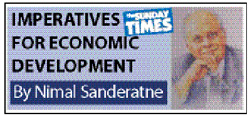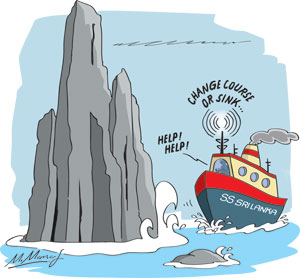News
Short-term and long-term resolution of external finances
View(s): The perilous state of the country’s external finances has not disappeared with a bang. Foreign reserves have fallen, foreign debt has increased and the balance of payments deficit continues to widen.
The perilous state of the country’s external finances has not disappeared with a bang. Foreign reserves have fallen, foreign debt has increased and the balance of payments deficit continues to widen.
Foreign assistance
However Chinese and Indian currency swaps and trade credit have provided a breathing space to resolve the financial problem and provide essential imports.
Current magnitude
The position of the external finances at the end of last year are yet unknown. They are likely to be worse than at the end of last October. At the end of October foreign reserves had fallen to a mere US$ 1.58 billion. Soon after, the Central Bank announced that the reserves had risen to US$ 3.1 billion. This was presumably by adding the currency swap of US$ 1.5 billion from India. An additional currency swap of US$ 400 million has also been approved by the Reserve Bank of India. On January 18 the government settled a debt of US$ 500 million. The current reserves are therefore likely to be less than at end of October.
 Currency swaps
Currency swaps
The currency swaps from India and China cannot be counted as reserves as the Indian Rupee and the Yuan are not convertible currencies. These if counted as reserves would boost the reserves. As these have to be returned, they are a part of the country’s debt.
Credit lines
In the current context of shortages of gas, fuel, pharmaceuticals, powdered milk and other essentials, the two credit lines of US$ 500 million from India to purchase these essentials are of much use. Similarly the credit line from China of Yuan equivalent to US$ 500 million is valuable to import raw materials for industry.
Gift of Rice
Even more significant is the Chinese government’s generous gift of one million metric tonnes of rice. Unlike the other facilities, this is an outright gift and does not increase the country’s debt or repayments.
External vulnerability
In spite of the invaluable assistance from China and India that would undoubtedly assist in overcoming the shortages of essentials, they do not resolve the critical condition of the country’s external vulnerability. The foreign debt has increased, debt repayment obligations are onerous and the balance of payments deficit is widening.
Policies
There is a need to take corrective measures to improve the balance of payments. What is needed is a set of policies that would address the fundamental weaknesses of the economy.
These should consist of immediate, short-term, and long-term policies that have to be implemented to resolve the fundamental weaknesses in the balance of payments. Complacency and procrastination would only aggravate the problem. Misinformation on the state of the reserves could lead to inappropriate policies.
Immediate relief
The Chinese line of credit of US$ 500 million would ease the availability of raw materials for industry, while the two credit lines each of US$ 500 million from India would ease the shortages of fuel food, and drugs. The expected generous gift of one million metric tons of rice would relieve the country’s shortfall in rice production next year.
This assistance is of vital significance in meeting the current economic difficulties. However, they do not resolve the current crisis in foreign reserves. In fact, they have increased the country’s debt as they have to be repaid. In contrast, the Chinese gift of one million metric tonnes of rice estimated as worth US$ 600-700 million will reduce the country’s import expenditure, reduce the trade deficit and ease the balance of payments.
Interesting issues
Whether the generous gift of tice from China was in recognition of the 1952 bold decision of the government to defy US sanctions on exporting rubber to China or whether there is a quid pro quo will be revealed only much later. Another interesting issue is whether the current geopolitical rivalry between China and India would lead to a competitive escalation of assistance.
Currency swaps
The currency swaps of US$ 1500 from the Chinese and Indian central banks would bolster the foreign reserves, but cannot be used to make payments for goods and services.
Persistent problem
The immediate problem of repaying debt obligations and finding the resources to tide over the crisis in food fuel and other essentials may have been overcome for the present, but the perilous state of the external finances persists. What is needed are immediate, short and long term solutions to resolve the country’s external financial vulnerability.
Immediate solution
The immediate measure that could be taken to relieve the foreign exchange situation is to allow the exchange rate to be market determined. The current administered exchange rate policy is reducing the inflows of foreign earnings to the country. This is particularly so in respect of inward remittances from Sri Lankan’s abroad.
After a short period of disruption owing to COVID-19, remittances continued to be as before. In fact, workers’ remittances, as they are called, increased in the early part of the year and was expected to reach US$ eight billion last year. However this has been thwarted by adopting an administered exchange rate that is about fifty rupees less than the market rate.
An additional ten rupees for remittances have failed to attract remittances by much. Although there is a claim that remittances increased in December last year in comparison with November, they continued to be much less than the amount in the previous year (2020).
If the exchange rate is allowed to float to its market rate, there would be an inflow of over US$ eight billion of remittances. This immediate measure would enhance the foreign reserves.
Exchange rate
A realistic or market-determined exchange rate would also make exports more competitive though import costs would increase and perhaps reduce import expenditure.
It would also divert other earnings such as from tourists to the banking system. Although the new regulation that tourists should settle their hotel bills in foreign exchange would stem the flow into the curb market, there would be other expenses that would be at the unofficial rate.
Short term
There are several short term measures that could benefit the external reserves. Among these is the reversal of the government’s impractical fertiliser policy. An early availability of chemical fertiliser and agrochemicals would revive agricultural production, decrease import needs and restore export earnings from tea, in particular. Similarly, other constraints on production such as power cuts and availability of raw materials for manufacturing must be resolved.
Medium and long-term
The most important and most difficult is the adoption of economic reforms that would stabilise the economy. Macro-economic policies must stabilise the economy. These would include the containment of the fiscal deficit, reduction of money expansion and reduction of losses in state enterprises. Unless these reforms are effectively implemented, the country would continue to live beyond its means and the balance of payments would widen, reserves would decline and debt repayment difficult.
Summing up
The severity of the foreign debt repayment problem requires immediate measures to alleviate the situation. These have to be followed by short-term policies. The ultimate and sustainable solution to the balance of payments crisis is the adoption of macroeconomic reforms.
Conclusion
The country’s foreign financial vulnerability is a fundamental disequilibrium that has to be resolved by reforming the economy. The foreign assistance received provides a breathing space to overcome the severe scarcities that threaten the lives of people. Immediate and short-term remedial measures could redeem the immediate problems to some extent. However, the fundamental problems of the economy could be resolved only by comprehensive reforms. These are painful and difficult to implement due to their political unpopularity and political culture. They are however imperative. The writing on the wall is: Reform or perish.
The best way to say that you found the home of your dreams is by finding it on Hitad.lk. We have listings for apartments for sale or rent in Sri Lanka, no matter what locale you're looking for! Whether you live in Colombo, Galle, Kandy, Matara, Jaffna and more - we've got them all!

